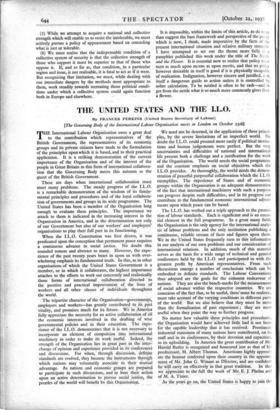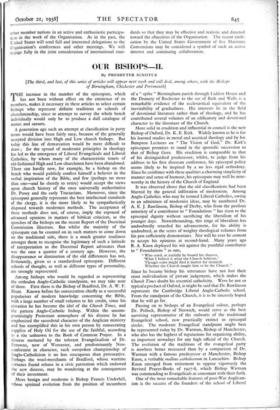THE UNITED STATES AND • THE
By FRANCES PERKINS (United States Secretary of Labour) [The Governing Body of the International Labour Organisation meets in London on October 25thl..
THE International Labour Organisation owes a great deal 1 to 'the contribution which representatives or the British Governinent, the representatives _ of its econcmif groups and its private citizens have made to the formulation of the principles upon which it is based, and to their practical application. It is a striking dernonstratinn of the current importance of the Organisation and of the interest of the people in Great Britain in this form of international Collabora- tion that the Goveining Body meets this autumn as the guest of the British Government.
These are days when international collaboration. must meet many problems. The steady progress of the I.L.O. is a remarkable demonstration of the wisdom of its runda7 mental principles and procedures and of the loyal collabora- tion of governments:and groups in, its wide programme. The United States has been a member of the Organisation long enough to evaluate these ptinciples. . The importance we attach to them is indicated in the increasing interest in the Organisation in ' America, and in the determination not only of our Government but also of our workers' and employers' organisations to play their full part in its functioning.
When the I.L.O. Constitution. was first drawn, it was predicated upon the conception that permanent peace -requires a continuous advance in social justice. No doubt this sounded remote and abstract to many However, the expe7 rience of the past twenty years bears in upon us with over- whelming emphasis its fundamental truth. In this, as in other organisations of which the United States GovernMent is a member, or in which it collaborates, the highest importance attaches to the efforts to work out concretely and "realistically those forms of international collaboration direCted to the positive and practical improvement- of the lives of workers and all other classes of individnalt throughPut the world.
The tripartite character of the Organisation—governments, employers and workers—has greatly contributed to, its past vitality, and promises ranch for its future.. We in America fully appreciate the necessity for an active Collaborationof all the economic interests involVed in the drafting of, wise governmental policies and in their education. The eve,. rience or the I.L.O. deniOnatrates that it is not necessary to incorporate an elenient of comptilsion international machinery in order to make its work UsefUl. Indeed, the strength of the _Organisation lies in great part in the inter: change of opinion and experience provided in its conferences and discuisions: For When,' through diseirssioh; definite standards are evolved, they become the instruments thzOtigli which nations may voluntarily associate to their mutual advantage. As nations and economic groups are prepared to participate in such discussions, and M base their action upOn an active determination to pursue social justice, the peoples of the world will benefit by this Orgaiiisatiop. We need net be deterred; in the application of these princi- ples; by the severe - limitations or an imPerrect world. No donbt the r:L.O.'ccitild proceed more easily if political institu- tions and human judgements were perfect. But the very uncertainties and difficulties of national and international life present both a challenge and a justification for the work Of the Organisation. The world needs the social programme and the constant emphasis 'on Social objeCtives whiCh the I.L.O. provides. As thornughly, the world needs the demon- stration 'of peaceful purposeful collaboration which the I.L.O. exemplifies. The experience of States and of economic ,groups within-the OrganisitiOn is an adequate demonstration of the fact that international machinery with such a purpoie can progress' despite such difficulties; and in its progress can Contribute to the fundamental economic international adjust- ments trpon which peace 'can be based.- - The I.L.O. has worked out a triple approach to the promd- tion of labour'standards. Each is significant and is an essen- tial element in the full programme. • In a great many fields the Organisation is the only agency for the international analy- sis of labOur problems and the only institution publishing a continuous, reliable stream of facts and figures upon them. We in the United States frequently turn to this 'information in our analysis of our own Problema and our consideration of international relations. In addition, much of this material serves as the basis for a wide range of technical and general conferences held by the I.L.O. and participated in. with the greatest profit by American representatives. From. such discusaions emerge a nunther of conclusions which can be embodied in definite standards. The-. LabOur ConVentions thus- adopted are the goals for- the common endeaVonr of nations. They are also the bench-marks- foithe measurement of social advance- within the reSpective 'countries. We are conscious of the fact that, to be useful, theiemust be realistic, must take account of the varying conditions in different Parts of the worick'---lint we also believe- that they Must- be more than the fornialisation of past experience ; tfiey are most useful-When they point the way to further progress: . and No matter how valuable these principles and procedures, theTOrganisation would haVe-tchieVed little had it not tien for the capable leadership that it has received. Prothinent industrial statesmen of many nations have contributed, on its staff am:fin its conferences, by their devotion and capacities, to its npbailding:- 'In America the great contributiOn.of Mr. Haibld Butler is recogniged and honoured hist as that of hi; predirCessor, 'M. Albert Thomai. Americans highly appreci- ate the honour conferred "upon their country in the appoint- nient of MX. John G. Winant as Director, and are confident he will carry on effectively in that great tradition: apPreciate to the full the work of 114r. E. J. Phelan and of M. A. Tixier. • . -As -the. yeara on, the United States is happy to join the : • other member nations in an active and enthusiastic participa- tion in the work of the Organisation. As in the past, the United States will send full and interested delegations to the Organisation's conferences and other meetings. We will engage fully in the joint consideration of international stan- dards so that they may be effective and realistic and directed toward the objectives of the Organisation. The recent ratifi- cation by the United States Government of five Maritime Conventions may be considered a symbol of such an active interest and continuing collaboration.
















































 Previous page
Previous page